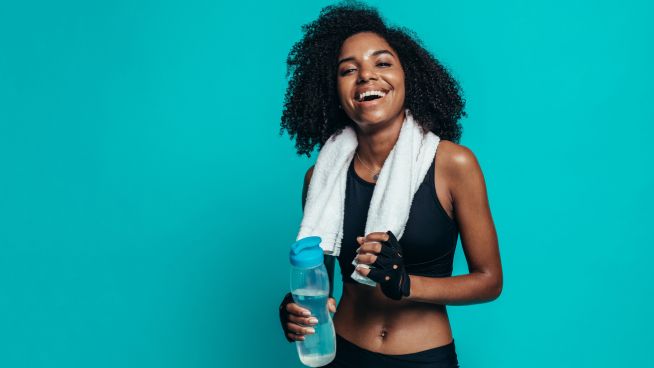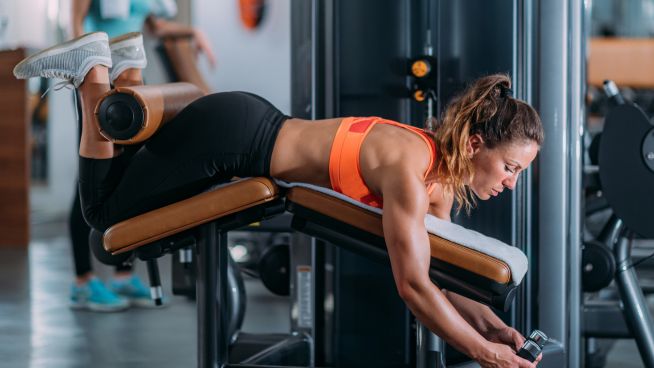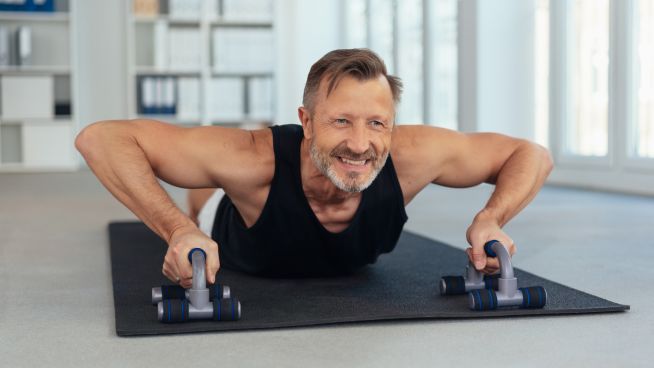Take This Vitamin for Better Workouts
Vitamin D deficiency is a common problem among athletes and the general population in Western countries.
Low vitamin D levels have been linked to several serious health issues, including cardiovascular disease, type 2 diabetes, cancer and increased mortality. Furthermore, vitamin D deficiency is related to depression, fatigue, general aches and pains, as well as impaired cognitive function. This situation is further exacerbated during winter when exposure to natural sunlight (our primary source of vitamin D) is at its lowest.
That’s the bad news. The good news is that optimizing your vitamin D levels can make a big difference in how you feel and function on and off the field.
How Vitamin D Improves Your Workouts
In addition to enhancing your overall health and reducing your risk of catching nasty diseases, vitamin D supplementation benefits athletes in numerous ways.
For one, daily vitamin D intake significantly increases both upper- and lower-limb strength—with studies showing strength gains ranging between 1.37 and 18.75%. A minor, though vital, detail is that these positive effects are caused by supplementing with vitamin D3. Vitamin D2 administration doesn’t seem to have any impact on strength.
More importantly, vitamin D also contributes to sports performance. In a British study, professional athletes and healthy non-athletes consumed 5,000 IU (125 µg) of D3 per day for eight weeks and witnessed significant improvements in 10-meter sprint time and vertical jump height. The researchers also summed up their findings by stating that inadequate vitamin D concentration is downright detrimental to athletic performance.
And if that wasn’t enough, boosting your vitamin D intake can even help prevent injuries. A recent study on NFL Scouting Combine participants found that low vitamin D levels can lead to lower extremity and core muscle strains, including the dreaded sports hernia.
How to Use This Information for Maximal Benefits
Obtaining sufficient vitamin D from food sources alone is difficult. Since we also can’t rely on natural sunlight to satisfy our vitamin D needs in the winter, exogenous supplementation becomes essential for maintaining a healthy vitamin D status.
So how much should you ingest to witness maximal health and performance benefits?
Current research suggests that previous guidelines capping daily vitamin D intake at 2,000 IU (50 µg) may have missed the mark by being too restrictive. To reach optimal vitamin D levels, you’ll very likely need to consume much more than that. In fact, intakes of up to 10,000 IU (250 µg) of D3 per day have been deemed both safe and effective in healthy subjects.
References:
-
Galesanu, C & Mocanu, V. “Vitamin D Deficiency and the Clinical Consequences.” Revista medico-chirurgicala a Societatii de Medici si Naturalisti din Iasi. 2015 Apr-Jun; 119(2):310-318.
-
Abrams, GD et al. “Effects of Vitamin D on Skeletal Muscle and Athletic Performance.” Journal of the American Academy of Orthopaedic Surgeons. 2018 Apr; 26(8):278-285.
-
Chiang, CM et al. “Effects of Vitamin D Supplementation on Muscle Strength in Athletes: A Systematic Review.” Journal of Strength and Conditioning Research. 2017 Feb; 31(2):566-574.
-
Close, GL et al. “Assessment of vitamin D concentration in non-supplemented professional athletes and healthy adults during the winter months in the UK: Implications for skeletal muscle function.” Journal of Sports Sciences. 2013; 31(4):344–353.
-
Hospital for Special Surgery. “More than half of college football athletes have inadequate levels of vitamin D: Vitamin D deficiency linked to muscle injuries.” ScienceDaily. 17 March 2017.
-
Nair, R & Maseeh, A. “Vitamin D: The ‘sunshine’ vitamin.” Journal of Pharmacology & Pharmacotherapeutics. 2012 Apr-Jun; 3(2):118–126.
-
Hathcock, JN et al. “Risk assessment for vitamin D.” American Journal of Clinical Nutrition. 2007 Jan; 85(1):6-18.
- Photo Credit: batuhan toker/iStock
- READ MORE:
- Your Vitamin D Supplement Probably Isn’t Working. Here’s How to Change That
- The Scientific Reasons You Feel More Tired During Winter
- Flu-Fighting Vitamins and Minerals
RECOMMENDED FOR YOU
MOST POPULAR
Take This Vitamin for Better Workouts
Vitamin D deficiency is a common problem among athletes and the general population in Western countries.
Low vitamin D levels have been linked to several serious health issues, including cardiovascular disease, type 2 diabetes, cancer and increased mortality. Furthermore, vitamin D deficiency is related to depression, fatigue, general aches and pains, as well as impaired cognitive function. This situation is further exacerbated during winter when exposure to natural sunlight (our primary source of vitamin D) is at its lowest.
That’s the bad news. The good news is that optimizing your vitamin D levels can make a big difference in how you feel and function on and off the field.
How Vitamin D Improves Your Workouts
In addition to enhancing your overall health and reducing your risk of catching nasty diseases, vitamin D supplementation benefits athletes in numerous ways.
For one, daily vitamin D intake significantly increases both upper- and lower-limb strength—with studies showing strength gains ranging between 1.37 and 18.75%. A minor, though vital, detail is that these positive effects are caused by supplementing with vitamin D3. Vitamin D2 administration doesn’t seem to have any impact on strength.
More importantly, vitamin D also contributes to sports performance. In a British study, professional athletes and healthy non-athletes consumed 5,000 IU (125 µg) of D3 per day for eight weeks and witnessed significant improvements in 10-meter sprint time and vertical jump height. The researchers also summed up their findings by stating that inadequate vitamin D concentration is downright detrimental to athletic performance.
And if that wasn’t enough, boosting your vitamin D intake can even help prevent injuries. A recent study on NFL Scouting Combine participants found that low vitamin D levels can lead to lower extremity and core muscle strains, including the dreaded sports hernia.
How to Use This Information for Maximal Benefits
Obtaining sufficient vitamin D from food sources alone is difficult. Since we also can’t rely on natural sunlight to satisfy our vitamin D needs in the winter, exogenous supplementation becomes essential for maintaining a healthy vitamin D status.
So how much should you ingest to witness maximal health and performance benefits?
Current research suggests that previous guidelines capping daily vitamin D intake at 2,000 IU (50 µg) may have missed the mark by being too restrictive. To reach optimal vitamin D levels, you’ll very likely need to consume much more than that. In fact, intakes of up to 10,000 IU (250 µg) of D3 per day have been deemed both safe and effective in healthy subjects.
References:
-
Galesanu, C & Mocanu, V. “Vitamin D Deficiency and the Clinical Consequences.” Revista medico-chirurgicala a Societatii de Medici si Naturalisti din Iasi. 2015 Apr-Jun; 119(2):310-318.
-
Abrams, GD et al. “Effects of Vitamin D on Skeletal Muscle and Athletic Performance.” Journal of the American Academy of Orthopaedic Surgeons. 2018 Apr; 26(8):278-285.
-
Chiang, CM et al. “Effects of Vitamin D Supplementation on Muscle Strength in Athletes: A Systematic Review.” Journal of Strength and Conditioning Research. 2017 Feb; 31(2):566-574.
-
Close, GL et al. “Assessment of vitamin D concentration in non-supplemented professional athletes and healthy adults during the winter months in the UK: Implications for skeletal muscle function.” Journal of Sports Sciences. 2013; 31(4):344–353.
-
Hospital for Special Surgery. “More than half of college football athletes have inadequate levels of vitamin D: Vitamin D deficiency linked to muscle injuries.” ScienceDaily. 17 March 2017.
-
Nair, R & Maseeh, A. “Vitamin D: The ‘sunshine’ vitamin.” Journal of Pharmacology & Pharmacotherapeutics. 2012 Apr-Jun; 3(2):118–126.
-
Hathcock, JN et al. “Risk assessment for vitamin D.” American Journal of Clinical Nutrition. 2007 Jan; 85(1):6-18.
- Photo Credit: batuhan toker/iStock
- READ MORE:
- Your Vitamin D Supplement Probably Isn’t Working. Here’s How to Change That
- The Scientific Reasons You Feel More Tired During Winter
- Flu-Fighting Vitamins and Minerals












